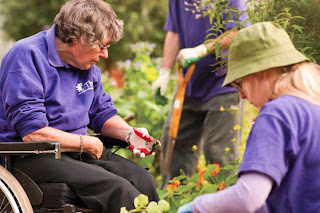John F Kennedy once said, ‘Ask not what your country can do
for you, but what you can do for your country.’ If we substitute community for country,
then we have an interesting question to answer.
We often forget that the land that most allotments are on is
owned not by the Society or in fact by the local authority but by the
community. It may be the local parish council, a local council, or a metropolitan
borough name on the freehold, but it remains community land. So how do
allotments integrate and work with the community? In this short series of articles,
we look at some of those communities and opportunities. There is no right or
wrong approach, just opportunities.
1.
People and Groups
Many allotments accommodate a local school; a plot where
those lucky enough to work it are taught into potentially becoming tomorrow’s
allotment and leisure gardeners. They also can benefit from environmental
studies and awareness about recycling, soil management, the impact of weather
changes and an understanding of horticulture, nature, and biodiversity are on
offer. An exposure to all aspects of health and wellbeing be it fresh food,
physical exercise, mental, biodiversity, wildlife, as well as the basic relationship
between growing produce and domestic science are also there for the schoolchildren
to appreciate.
The Greek philosopher Aristotle once said, ‘Give me a child until he is seven and I will show you the man’. I would not limit to seven and an child engaged in an allotment will influence others and could even teach their own parents and enthuse them. The skills learnt will never be forgotten and are practical ones that can be used later in life.
Last year the schoolchildren who work the plot won a London award presented by Alan Titchmarsh.
The allotment can’t accommodate more; we have already cut
many plots in half and all new starters must start on a half plot which in real
terms is actually a quarter plot. Perhaps we should take the allotments to the
people? We have one initiative with a housing association to create community
garden plots within the estate land which is often grassed and planted for low maintenance.
We are getting those in the estate and on the waiting list engaged and, if it
works, aim to push it further.
Then there are those less fortunate than us who have
physical and mental challenges and could not work a plot without supervision,
help and care. It is not easy finding the right group and even harder to find
the right space, but it can be extremely rewarding all round. It is not a case
of building disabled beds and looking for the group, but perhaps working with a
group to meet their special needs. Again, the space does not have to be within
the allotments, it is about sharing time and experience to help other less
fortunate enjoy what we take for granted.
Finally, a doctor started to bring a few of their hospital co-workers
to their plot. We had to check who the visitors were and authorise it during Covid
but suddenly the plot was transformed in a season and you realised that key
workers need a break, need to unwind and allotments are the perfect tonic for
many. It certainly makes you think about the wider community.
Winston Churchill once said, ‘The pessimist sees difficulty
in every opportunity, the optimist sees opportunity in every difficulty.’ You cannot
cover all the community opportunities, neither can you always get them right,
but in today’s space poor environment we perhaps should share more.



